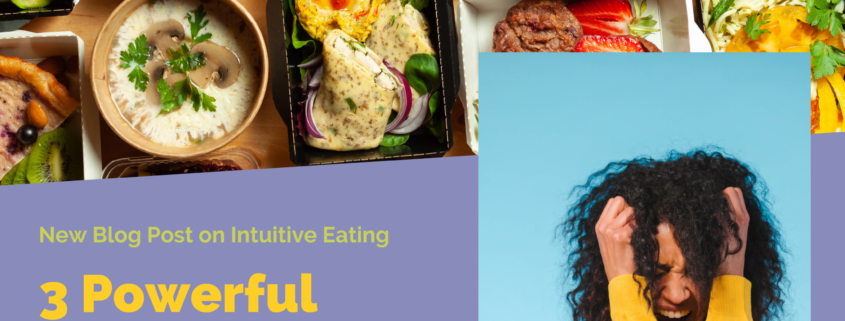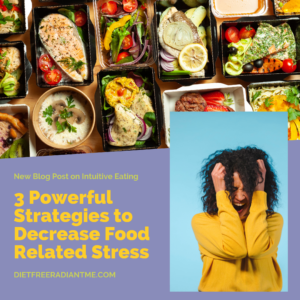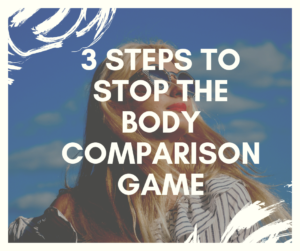 How many servings of grains should I eat each day? How about protein, fruit, veggies, and fat? These are questions I used to get all the time when I created meal plans for clients.
How many servings of grains should I eat each day? How about protein, fruit, veggies, and fat? These are questions I used to get all the time when I created meal plans for clients.
That was back in the day when I was doing weight loss counseling (cringe!). The meal plans I created always “worked” for clients if they “followed” them to a T. But the problem was, they were not able to follow them exactly because they had a life to live. They had birthday parties to go to, vacations to go on, business dinners to attend. And once they felt like they couldn’t “stick” to the plan, they started making choices that didn’t honor their health.
Of course, we know what followed. Guilt, shame, feelings of disappointment and frustration. Then back on the meal plan, only for history to repeat itself.
Energy In = Energy Out
When I was in school, I learned about energy in = energy out. And in order to lose weight, you had to take in 500 less calories per day, or expend 500 extra calories per day, to lose 1 pound per week. Nutrition science has come a long way since I was in school.
In those early days of counseling, this is how I calculated weight loss meal plans for clients. I first calculated how much energy (aka calories) one needed to take in to maintain current weight. I then subtracted 500 calories and created a meal plan. I encouraged exercise to expend even more energy, this way my client would lose even more weight.
The problem with this is that THE BODY IS NOT A CALCULATOR.
This formula doesn’t work like this in real life. There are many factors that affect how you absorb the calories that you eat such as medications you might be on, medical conditions/diseases that you might have, your genetic makeup and the bacteria in your intestines to name a few.
You cannot manipulate this energy equation by eating less or exercising more to promote weight loss.
Once I realized this, I stopped calculating precise meal plans for clients.
2 Variables that Affect Your Body Weight
Manipulating your energy input and output isn’t going to help you achieve the body you want. But there are certain variables that will affect your body weight that are often NOT addressed. These are:
- Stress: Do you live in a chronically stressed state? If yes, then your stress hormones (specifically cortisol) are streaming through your body wreaking havoc on your physical, behavioral and emotional health. Perhaps it’s time to figure out what is stressing you out and work on de-stressing with some tried and true stress management techniques such as meditation, yoga, deep breathing, etc. Learn more here!
- Sleep: Do you get enough sleep each night? There is no magic number but there are enough studies that show that most people need between 7-8 hours of solid sleep. Here’s a hint: If you wake up the next morning yawning, you are not getting restorative sleep. Perhaps it’s time to put a sleep program into place.
What About Food/Nutrition and Exercise?
You might think because I teach intuitive eating, that I don’t regard nutrition and exercise. This is NOT TRUE! What you put into your body and the movement you do (or don’t do) each day has an important impact on how you feel.
The way that I encourage my clients to address food/nutrition and exercise is through a gentle lens. Only when they have rid themselves of the diet mentality can they move into this final step of their intuitive eating journey. And that goes for you too.
If you are still counting calories and watching the calorie counter on the treadmill in the gym, then you are not yet ready for gentle nutrition and movement. But if you have given up the calorie counting and watching and have regained the trust in your body to guide your eating, then by all means it’s time to start taking a closer look at the foods you are choosing and the movement you are doing (more on this in a future post!)
Final Thoughts
If you are still convinced that watching every calorie you eat is going to make a difference in your body weight, then please show some compassion for yourself. It’s okay, you are surrounded by a culture that has us believing this and I truly know that it’s hard to move away from it (take it from someone who used to calorie count…me!).
With time, you will learn to make smart eating choices from a place of self-care. In the meantime, if you need support, you can always reach out to me here!
 Society has women believing that they need to look a certain way and weigh a certain number and if they don’t measure up, then they are not worthy of love, success and happiness. They tie their self-worth into a number on a scale which leads them to body hatred and self-hatred and continuously looking for the next diet.
Society has women believing that they need to look a certain way and weigh a certain number and if they don’t measure up, then they are not worthy of love, success and happiness. They tie their self-worth into a number on a scale which leads them to body hatred and self-hatred and continuously looking for the next diet.






















